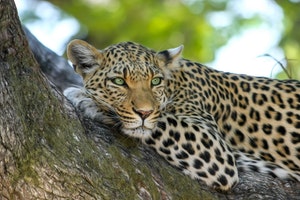Made at Reading: University science saves wildlife
19 June 2019

Protecting endangered leopards, supporting pollinators that underpin the world’s food production and discovering how plastic pollution is taking to the skies are among the pioneering ecological research projects being led by University of Reading scientists.
Researchers at Reading are investigating how to protect animals and humans around the world from environmental threats to their existence.
This is just one area of Reading’s world-leading environmental research, which is being highlighted all this week as part of #madeatreading, a week-long campaign highlighting Reading’s environmental research and action. The week culminates in ‘Show Your Stripes’ day on Friday 21 June, which invites the public to download and share new graphics by Reading researcher Professor Ed Hawkins at showyourstripes.info. They show how every corner of the globe is warming.
Phil Newton, Research Dean for Environment at the University of Reading, said:
“We are proud to be at the forefront of efforts to identify threats to ecosystems and wildlife worldwide and prevent them from irreparable damage or disappearing forever. These plants and animals define our planet, and our researchers are helping to give them - and us - the chance to thrive long into the future.”
The University of Reading was ranked as the number one UK university for citations in environmental and ecological research by research analysis system InCites. Its research is helping to:
- Protect rare leopards in South Africa, which are threatened by poaching and habitat loss. Zoologist Dr Tara Pirie is monitoring the big cats in reserves, including the exceptionally rare strawberry leopard, to learn about their behaviour in the wild and identify the best methods of conservation. This has helped authorities in the country to reduce the conflict between the leopards and humans.
- Take action to prevent a decline in pollinators and reduce threats created by intensive farming and climate change. This is important because pollinators are responsible for more than 30% of global crop production. Reading’s Professor Simon Potts has written reports for the United Nations on preventing a global crisis and co-founded the World Bee Project, which is using artificial intelligence to learn more about healthy habitats. · Identify invasive plants of the future. Researcher Tomos Jones in Biological Sciences won Gold at Chelsea Flower Show in May for an innovative exhibit highlighting this work. The plants were chosen by gardeners who were asked which ornamental plants were beginning to invade their own gardens. The research also shows gardeners how to prevent new plants from invading the countryside. · Combat threats to global biodiversity. Professor Tom Oliver is studying the impact land use and climate change is having on wildlife like birds and butterflies, in order to support environmental decision-making, and advises the UK government on policies to protect the environment.
- Discover new ways plastic is polluting the environment. Research by Professor Amanda Callaghan has demonstrated how microplastics are able to transfer from larvae to adult mosquitoes after being eaten by the larvae in bodies of water. This has wider ecological implications when birds eat the mosquitoes, allowing plastic to enter the food chain.
- Better conserve elephants in Africa. PhD researcher Vicky Boult studies how Africa’s growing population has impacted endangered elephants, yet how some areas are actually considered to have too many elephants. The work of ecologist Dr Graham Holloway on African vultures is also linked to efforts to prevent illegal poaching of elephants.
Follow the University’s campaign activities throughout the week on Twitter, Facebook and Instagram, and join the discussion using the hashtag #madeatreading
